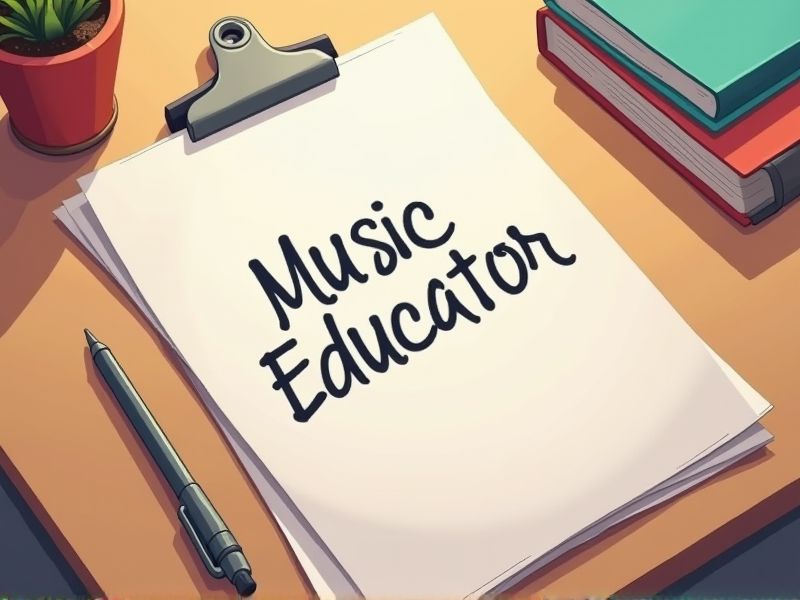
In the evolving landscape of music education, certain certifications ensure educators possess the necessary skills and knowledge to effectively teach diverse learners. These certifications establish a standardized benchmark for teaching competencies, enhancing both educator credibility and student outcomes. They also open pathways to professional development and advancement within educational institutions. Here are some important certifications you may need to consider as a music educator.
State Music Education Certification
State Music Education Certification ensures standardized qualifications, establishing a baseline of competence for music educators. Certified teachers are more likely to incorporate evidence-based teaching methods, improving student outcomes. Certification often correlates with better job security and professional recognition, attracting more individuals to pursue teaching careers. Programs with certified educators tend to exhibit higher student performance in music assessments, reflecting the educator's proficiency.
National Board Certification in Music Education
National Board Certification in Music Education enhances a music educator's skills by providing a structured framework that supports continuous professional development. This certification validates a teacher's expertise, thereby increasing their credibility and potentially leading to better career opportunities. Holding the certification positively impacts student outcomes, as teachers apply evidence-based practices in their instruction. Many schools and districts offer financial incentives for certified teachers, which can make the pursuit of this certification economically beneficial.
Certificate in Music Theory and Pedagogy
A Certificate in Music Theory and Pedagogy equips music educators with advanced knowledge, enhancing their ability to teach complex musical concepts. Proficiency in pedagogy ensures the educator can effectively communicate and adapt lessons to diverse learning styles. This certification often results in increased job opportunities and career advancement. Educators with specialized certificates generally experience improved student outcomes and engagement in music education.
Certificate in Choral Conducting
A Certificate in Choral Conducting enhances a music educator's ability to effectively lead and inspire vocal ensembles. It provides specialized training in advanced conducting techniques and score interpretation, improving overall musical performance. Gaining this certification can open up more career opportunities and prestige within educational institutions. It equips educators with the necessary skills for fostering a deeper appreciation of choral music among students.
Certificate in Instrumental Music Instruction
Music educators require a Certificate in Instrumental Music Instruction to formally validate their teaching competence and specialized musical skills. Possessing this certification increases the educator's credibility, making it easier to gain trust from students, parents, and educational institutions. The certificate ensures educators are equipped with updated teaching methodologies that have been proven to enhance student learning and engagement. Schools and music programs often seek certified instructors as a measure to maintain high educational standards and improve program outcomes.
Certification in Music Technology Integration
The increasing incorporation of technology in music instruction necessitates a certification in Music Technology Integration to enhance teaching methodologies. Music educators equipped with this certification can effectively employ software and hardware tools, fostering students' digital musicianship skills. This certification also bolsters educators' confidence and competence in using modern technologies to create more engaging and interactive learning environments. Schools and educational institutions may prioritize hiring certified educators, recognizing their ability to adapt to and implement digital advancements in the curriculum.
Certificate in Vocal Pedagogy
A Certificate in Vocal Pedagogy enables music educators to deepen their understanding of vocal techniques, optimizing their ability to instruct students effectively. This qualification enhances a teacher's ability to diagnose vocal issues, fostering a healthier vocal progression for learners. It equips educators with evidence-based teaching strategies, ensuring instruction is grounded in the latest vocal science research. Credentialing in vocal pedagogy often leads to higher professional recognition, which can translate into more career opportunities and advancement in educational settings.
Certificate in Ensemble Conducting
Music educators seeking to expand their teaching repertoire can benefit from a Certificate in Ensemble Conducting, as it provides advanced skills in leading musical groups effectively. This certification can enhance their understanding of diverse musical styles, allowing them to introduce students to a wider range of compositions. By mastering ensemble dynamics, educators can improve the overall performance quality of student groups, leading to more successful concerts and competitions. Professional credibility often increases with additional certification, potentially opening up more career opportunities within academic and extracurricular music programs.
Certification in Digital Music Composition
Certification in Digital Music Composition equips music educators with up-to-date technological skills necessary for modern music creation. Understanding digital tools enables educators to better instruct students on contemporary composition methods. Mastery of digital platforms increases job competitiveness, broadening career opportunities within educational settings. This certification also enhances educators' ability to integrate digital resources into existing music curricula.
Certificate in Educational Technology for Music Educators
Evolving technology has integrated into education, compelling music educators to adapt and incorporate new digital tools in their teaching methods. A Certificate in Educational Technology can equip music educators with essential skills to enhance student engagement through interactive and tech-driven lessons. By mastering music-specific software and platforms, educators can streamline lesson planning and student assessments, leading to more efficient learning outcomes. The certificate also positively impacts career progression, as institutions increasingly seek educators who can seamlessly merge technology with traditional music education.
Summary
As a music educator obtaining certifications, you can expect enhanced teaching skills and increased credibility within the educational community. Such certifications often lead to more job opportunities and potentially higher salaries due to recognized qualifications. Enhanced certifications also facilitate better student outcomes as educators can apply advanced methodologies. Furthermore, these credentials may offer access to professional networks, fostering collaboration and further learning.
